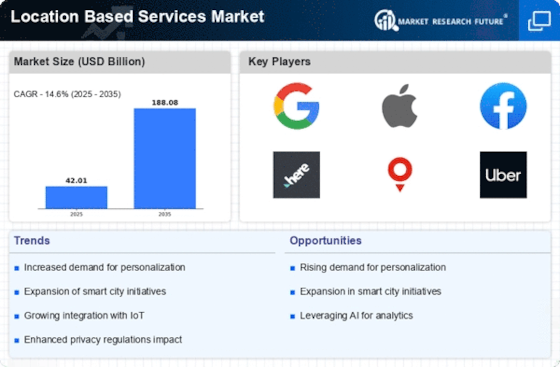Top Industry Leaders in the Location Based Service Market

Competitive Landscape of Location Based Services Market
The Location-Based Services (LBS) market is experiencing explosive growth, driven by the ubiquitous presence of smartphones and the increasing demand for location-aware applications. This dynamic landscape demands a close examination of the key players, their strategies, and the factors influencing market share. This analysis aims to provide a comprehensive overview of the competitive terrain within the LBS market.
Key Players:
- Microsoft Corporation (US)
- Oracle Corporation (US)
- TomTom International BV (Netherlands)
- ESRI (Germany)
- Ericsson (Sweden)
- Qualcomm Incorporated (US)
- ROKK (US)
- iSpace (US)
- Apple Inc (US)
- Baidu Inc (China)
- NavInfo Co., Ltd. (China)
- IBM (US)
- Google Inc (US)
- Cisco Systems, Inc.(US)
- com Inc. (US)
- HERE Technology (Netherlands)
- Mapbox (Netherlands)
Strategies:
To stay ahead in this competitive market, companies are adopting diverse strategies, including:
- Platform Development: Building comprehensive platforms that integrate various LBS functionalities, including mapping, navigation, location data analytics, and location-based advertising.
- Data Acquisition and Enrichment: Continuously improving data quality and accuracy through various sources like satellite imagery, street-level imagery, and user-generated data.
- APIs and SDKs: Providing developers with tools and APIs to integrate location-based services into their applications, fostering a thriving ecosystem of LBS-powered solutions.
- Strategic Partnerships: Collaborating with other companies to expand reach, access new technologies, and tap into untapped markets.
- Focus on Privacy: Prioritizing user privacy and security to gain trust and comply with evolving regulations.
- Investment in Emerging Technologies: Investing in AI, AR/VR, and other cutting-edge technologies to develop innovative LBS solutions.
Market Share Analysis: Several factors influence market share in the LBS market:
- Brand Recognition and User Base: Established players with large user bases and strong brand recognition have a significant advantage.
- Data Quality and Coverage: The quality and comprehensiveness of location data are crucial for delivering accurate and reliable services.
- Technology and Innovation: Companies actively investing in technological advancements and innovative solutions are better positioned to capture market share.
- Geographic Focus: Targeting specific regions with tailored offerings can lead to market dominance in those areas.
- Pricing Strategies: Competitive pricing models that offer value for money can attract customers and expand market share.
New and Emerging Companies: The LBS market continues to attract new players, particularly those focused on specific niches or leveraging emerging technologies. Some notable examples include:
- Mapillary: A crowdsourced platform for capturing and sharing street-level imagery.
- OpenStreetMap: A collaborative project to create a free and editable map of the world.
- Unacast: A location data platform focused on understanding and predicting human movement patterns.
- Carmera: A platform using AI to analyze street-level imagery and provide insights into traffic patterns and pedestrian behavior.
- IndoorAtlas: A provider of indoor mapping and navigation solutions for large buildings and complexes.
Current Investment Trends: Companies are actively investing in various areas to maintain competitive advantage:
- AI and Machine Learning: To improve data analytics, personalize user experiences, and develop predictive location-based services.
- AR/VR: To create immersive location-based experiences and enhance user engagement.
- 5G and Edge Computing: To enable faster data processing and support real-time location-based applications.
- Privacy-Preserving Technologies: To ensure user data protection and address evolving privacy concerns.
- Vertical-Specific Solutions: Developing customized LBS solutions for specific industries like logistics, retail, and healthcare.
Latest Company Updates:
With interesting capabilities for application development, Esri extended and improved its location services offering in 2023 and made it available to developers via ArcGIS Platform. Places, Data Hosting, and an upgraded Basemap Styles service are among the new offerings. Users in the digital sphere anticipate location-aware, personalised experiences catered to their unique wants and preferences from apps and solutions. Using location services and maps to their full potential, ArcGIS Platform enables developers to build solutions that go above and beyond what users might ask for.










